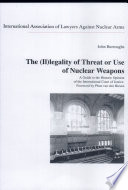
The Legality of Threat Or Use of Nuclear Weapons
By - Burroughs, John,
Floor
-
Floor 1
ISBN 10 - 3825835162
ISBN 13 - 9783825835163
Book Status
-
2 Qnty Available with us.
Subject
-
Nuclear weapons
Shelf No
-
18
Call Number
-
341.734 BUR